Asphalt Shingle
Statement: Asphalt shingle is a new type of roofing material with the dual functions of decoration and waterproofing. The asphalt shingle product is made of glass fiber mat as the base, and after being dipped in petroleum asphalt, one side is covered with colored mineral particles, and the other side is sprinkled with insulating material. 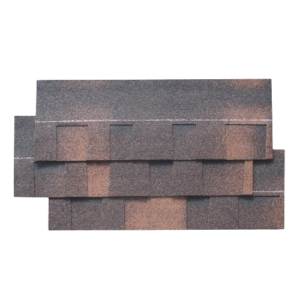
Pros:
- Asphalt shingles have a variety of shapes, rich colors, and a wide range of applications.
2. Asphalt shingles can have an effect on heat insulation and heat preservation.
3. Asphalt shingles are light in weight, making the roof light and safe.
4. Asphalt shingle construction is simple and low cost.
5. Asphalt shingles are waterproof, wind-resistant, and corrosion-resistant.
Cons:
- Bad weather can easily cause falling off.
2. Excessive temperature can easily cause cracks in asphalt shingles.
3. Asphalt shingle construction weather should not be too cold.
4. Asphalt shingles are not the most energy-efficient roofing material.
5. The service life is not long and it is easy to age.
6. Poor flame retardancy of asphalt shingles.
Clay Tile
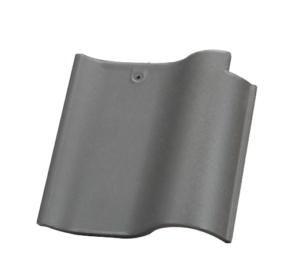
Statement Clay tiles are made of natural clay, mixed with aging, and then directly vacuum extruded. The surface can also be glazed or the natural color of clay can be used.
Pros:
- Natural, clay tiles are high-quality natural products.
- Durability. Under normal circumstances, clay roof tiles have a long life. Terracotta tiles are world-famous for their durability, high resistance to air pollution, color durability, and shape stability.
- In the case of temperature and humidity changes, the fired clay basically does not shrink and expand. This feature ensures the dimensional stability of the clay roof tile. This means that the terracotta tiles can withstand the test of wind, frost, snow, and rain, and will not let people hear the annoying cracking sound.
- Because of its stable chemical properties, it is not affected by possible chemical substances. Terracotta roof tiles have a long-lasting beauty. Even after a period of use, the surface of the terracotta tiles will show a natural luster, but the color of the terracotta tiles under the luster will never fade.
Cons:
- Clay tiles are more expensive.
- The weight of clay is large. If you need to install clay tiles, you must first estimate the bearing capacity of the roof, and if necessary, strengthen the original structure.
- Although the clay tile has a long lifespan, it will easily break due to external impact.
- The installation of clay tiles is very difficult and must be installed manually.
Concrete Tile
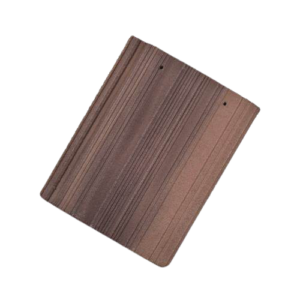
Statement: Concrete brick, because its raw material is cement, it is usually called cement tile. Although there are many types of concrete tiles, they can be divided into three main categories, namely corrugated tiles, S-shaped excellent, and flat tiles. According to the production process, it can also be divided into two categories: roll pressed tiles and molded tiles.
Pro:
- The product has high density, high strength, good rain and frost resistance, smooth surface, and accurate size.
- The roof waterproof is good, because of its lightweight, it is suitable for earthquake-prone areas and can effectively reduce post-earthquake losses.
- The colored cement tile has a variety of colors and has a long service life. The pressed full-body cement brick has a durable color and a moderate cost. It is not only suitable for ordinary houses, but also for waterproof and heat insulation of high-end villas and high-rise buildings.
Cons:
- The concrete tiles are brittle and prone to cracking and embrittlement.
- The installation is cumbersome and easy to be damaged by brittleness.
- High water absorption and poor waterproof performance.
Metal Tile
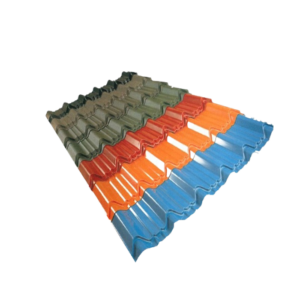
Statement Metal roofing materials have a long history of the application. According to different roofing materials, metal roofing systems include colored steel roofs, aluminum alloy roofs, titanium zinc sheets, copper sheets, and stainless steel roofs.
Pros:
- The metal roof system is made up of lightweight materials and is lighter in weight.
2. Based on the durability of metal plates and surface coatings, metal roof panels have good corrosion resistance, good aging resistance, and corrosion resistance, and can maintain good performance and functions with less maintenance.
3. High strength, stable structure performance, safe and reliable use.
4. Good waterproof performance and long-lasting stability.
5. It has good workability and can meet the appearance requirements of different buildings.
6. The components of the metal roof system adopt factory prefabrication or on-site assembly methods, which have good adaptability.
7. Excellent fire resistance.
8. The metal roofing material is recyclable and is an ideal green building material.
Cons:
- It is slippery when it is wet and snowy, and there is a safety hazard.
- In bad weather, the noise will be loud.
- It is easy to fade and stain easily.
- Installation is very complicated and requires specialized personnel to install.
- The price is high. Although durability is directly proportional to price, it still exceeds most people’s budget.
Galvalume Tile
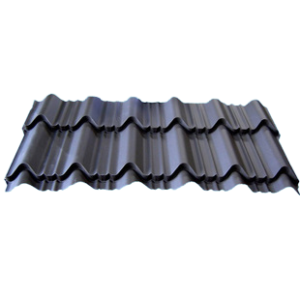
Statement The aluminum-zinc tile is a cold-rolled hard steel plate with various strength and thickness specifications as the base material, which is obtained by hot-dip coating of the AL-Zn alloy-plated aluminum-zinc tile.
Pros:
1. With strong processing performance, it can meet various processing requirements.
2. High corrosion resistance.
3. High light reflection performance and heat resistance performance.
4. Lighter texture and convenient installation.
Cons:
1. Poor welding performance.
2. The sound insulation effect is not good.
3. The price is high, and the maintenance cost is high.
Galvanized Tile
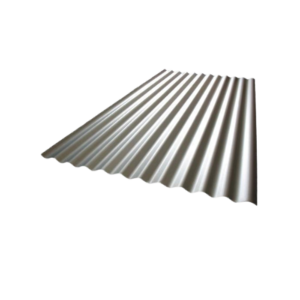
Statement Galvanized tile refers to a metal tile with a layer of zinc on the surface.
Pro:
1. It has strong corrosion resistance.
2. Beautiful and clean. It is decorative.
3. Strong anti-oxidation ability and long service life.
Cons:
1. When damp or immersed in rain, it will easily become a white powder, and its anti-corrosion performance will decrease.
2. The price is higher.
3. Color difference.
Slate
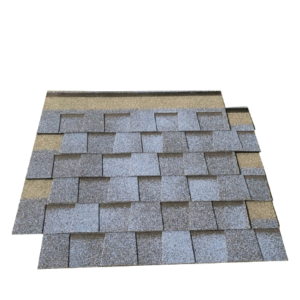
Statement Slate tiles are made of slate or shale. The biggest difference from other stones is that slate tiles have natural joints. The joints are split to form plates of different thicknesses. Slate roofing is a traditional product and has different characteristics from other roofing materials. Slate tiles are favored by architects who pursue architectural individual styles for their natural level and elegant and rustic style.
Pros:
- The appearance is beautiful and delicate and there are many colors to choose from.
- The slate is dense, hard, extremely hard, and durable. If the slate tiles are well maintained, the homeowner does not have to worry about replacing the roof.
- Non-flammable, waterproof, and fireproof. The slate itself is completely fireproof.
- Environmental protection and recyclable.
Cons:
- The price is high and it is easy to exceed the budget.
- The weight of slate tiles is relatively large. It is necessary to estimate the bearing area of the roof and strengthen the roof structure if necessary.
- The installation is complicated, the installation cost is high, and it is difficult to find qualified installers.
- Can not withstand all climates and is easily eroded.
Wood Shingles
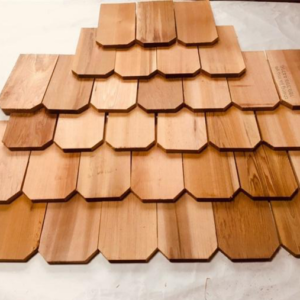
Statement Wood shingle is a decorative material that replaces traditional roof and wall tiles. Wood shingle is a new environmentally friendly material with beauty and miracles.
The natural and simple appearance of shingles brings amazing effects to building decoration. Whether it is for traditional architectural decoration or current European and American style decoration, the rich, warm color and natural texture of wood shingles can be perfectly integrated into any environment.
Pros:
- It has excellent stability and is not easy to deform.
- High waterproof performance.
- Capable of heat insulation, heat preservation, and UV protection.
- Rich colors, safe, and environmentally friendly.
- Excellent weather resistance and long service life.
- The installation cost is low, simple, and convenient.
Cons:
- Shingles are prone to pests and molds.
- It is not fireproof and is prone to fire.
- Serious fading.
- Prone to cracks and high maintenance frequency.
PVC Shingles
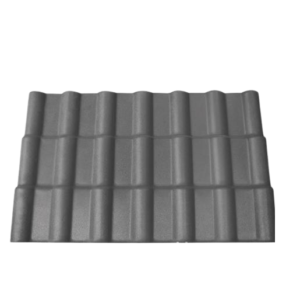
Statement Resin tile is a new type of roofing material that has been synthesized, produced through chemical processes. Resin tiles are divided into natural resin tiles and synthetic resin tiles. The resin on the Baidu market is generally synthetic resin tiles.
Pros:
1. Has good corrosion resistance.
2. In terms of color, it can maintain longer freshness.
3. The service life can reach 30 years.
4. The sound insulation effect is good, and the fire rating is also very outstanding.
5. The heat insulation effect is very good in winter, and the room is cool in summer.
6. The product has low density, is not easy to absorb water, and has good waterproof performance. And the self-cleaning performance is superior.
7. Low temperature resistance and impact resistance.
8. Green and environmentally friendly and easy to install.
Cons:
1. Poor high temperature resistance.
2. Thermal expansion, will expand with heat and contract with cold.
3. Not suitable for flat roof and large span roof.
Color Steel Tile
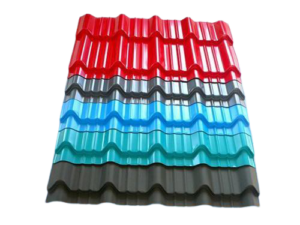
Statement Color steel tile is a product made of cold-rolled steel plate and galvanized steel plate, after surface chemical treatment, coating, and then baking and curing.
It is a relatively common roof decoration, often used in the roof of warehouses or temporary buildings, and has a strong decorative effect.
Pros:
1. Light weight, only about 10-14 kilograms per square.
2. Good heat preservation and heat insulation performance.
3. High strength, excellent resistance to bending and compression.
4. Bright color and long life.
5. The installation is flexible and convenient, shortening the construction time.
6. Excellent fire resistance, not easy to burn in case of fire.
Cons:
1. The maintenance cost is high, and the outside is easy to fall off.
2. As time grows, it is prone to corrosion due to moisture.
3. Poor sound insulation.
4. Because of its lighter texture, the ability to resist wind and snow is poor.
Solar Tile
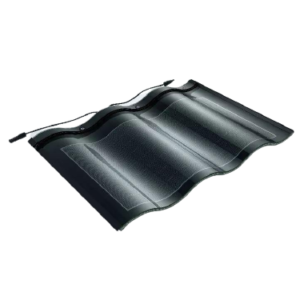
Statement Solar tiles can protect your roof and can be used to power household appliances. By reducing their dependence on electricity, they can reduce the pollution caused by power plants, thus having a positive impact on the environment.
Pros:
- Various styles, beautiful and generous. Stylish and modern.
- There are no gaps between the solar tiles, the tile surface can be cleaned infrequently, and the maintenance cost is low.
- More durable than ordinary roofing. Able to withstand strong winds.
- It can add value to your house.
- Reduce electricity bills, environmental protection.
Cons:
- High installation cost.
- The installation area is limited by light. And the roof must face south.
- It is not easy to get close. In this case, the ice and snow on the square can not be removed.
- Penetrating the roof (perforating holes is required when fixing the square array on the roof) may cause roof leakage.
Points To Note When Choosing Roofing Materials
- Know the weight of the corresponding roofing materials, do you need to strengthen the house structure?
- Is the cost of the roofing material within your budget and can you accept the service life?
- Does the installation and maintenance of the roofing material require additional problems and costs?
- Can the roofing material provide good performance under the weather conditions in your area?
- Does the roofing material conform to the color and style of the building?
- Does the selected roofing material comply with local fire protection codes?
Factors Influencing The Durability Of Roofing Materials
- Slope: Slope is an important factor for the normal function of the roof system. When the use of single-layer roofs and low-slope roofs have become a popular practice, it provides designers with an opportunity to design economical roofing systems and save the overall building cost.
- Drainage: The roof drainage system and slope are two completely different concepts. Drainage refers to the ability of the roof system to take water away. In the construction of new buildings, drainage is a simple design element that must comply with the requirements of the code.
- Fixing: The three commonly used laying methods for waterproofing membranes are empty roofing, mechanical fixing, and full adhesion. Coiled roofing with a protective layer (PMA) is the fourth type of composite fixing method, that is, the roofing coil is fully glued or not fully glued, but the insulation material requires pressing.
- Material durability: The durability of the material refers to the ability of the roof system to resist the spread of fire, weathering, natural or man-made influences without causing significant changes in the function of the coil.
- Constructability: Constructability refers to construction factors, including constructing a roof system on a specific building, and considering the location, height, construction method, purpose, and living conditions of the building.
- Maintenance: All roof systems should be maintained during their life cycle. Proper maintenance can extend the life of the building and ultimately reduce the cost of the owner. The choice of roofing system should also consider the difficulty of its maintenance. For waterproof membranes with exposed, coated, sandy or fine-grained surfaces, it is easier to maintain, and routine inspections are sufficient.
- Sustainability: The characteristics of sustainable roofing include reducing heat island effect, enhancing light reflectivity, eliminating rainwater block, and also including the impact on the environment (such as the impact of roofing materials on the environment during production, installation, handling, and disposal).
Applications Of Roofing Materials
- The workshop, hood for vehicle: color steel tile, asbestos tile, PVC tile, etc., with short service life and good price.
- Private houses: clay tiles, glazed tiles, Spanish tiles, chain tiles, cement tiles, etc., bulky and unsightly, with good prices.
- Temples, pavilions, and other ancient buildings: ancient architectural ceramic tiles, ancient architectural metal tiles, etc., characteristic products.
- Wooden house, light steel structure: asphalt shingles, colored stone metal shingles, etc., asphalt shingles have a short service life, and metal shingles are expensive.
- Small villas, clubs, hotels, high-end residential areas: asphalt shingles, colored stone metal shingles, solar shingles, resin shingles, etc., relatively speaking, they are more beautiful and expensive.
If you want to get more information about steel coil for sale, welcome to contact us.














